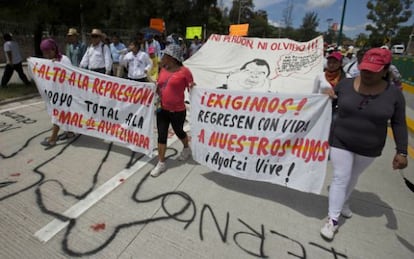Ayotzinapa, the cradle of Mexico’s rebel teachers
The town’s students, like those killed in Iguala, have a history of fighting for social causes


To attend the teacher training college in Ayotzinapa, students need to pass an exam and agree to an evaluation of their family’s finances. Bernardo Flores is the son of a farmer. His file notes two family assets: an adobe home with a zinc roof and an old mare. Flores fulfilled the low-income requirements and showed the will to become a teacher in one of the rural communities scattered in the mountains. He became an exemplary student. “El Cochi” – as he is known – has been missing for 12 days. On September 26, he and 42 other students were kidnapped by Iguala’s municipal police, a security force controlled by organized crime.
The school is located on a country road, three hours from Mexico City. Most students are from farming families that grow corn and beans. They study and sleep in shared rooms. Decisions about internal rules and regulations are taken by assemblies where members vote by a show of hands and the revolutionary rhetoric is strong. Messages on the walls of the hallways champion the struggle of workers and farmers. “The cradle of social conscience,” one poster at the entrance says. Poverty, violence and political corruption in the southeastern Mexican state of Guerrero create the ideal breeding ground for generations of idealistic youths who reject the status quo.
Two Fridays ago, 100 first- and second-year student teachers traveled to Iguala – about 100 kilometers away – by bus. The students have a habit of seizing buses and forcing drivers to take them to their chosen destination. “We have the authority to put these vehicles at the service of the people,” a member of the school’s directing committee says. That day they went to the bus station in Iguala to take over three more buses and, as they set off for the highway that would take them to the city, municipal police stopped the vehicles. The students on the first bus got off to ask the officers to clear the road and leave them alone. “Several of us tried to move the police car they had parked there and that’s when they screwed us,” one student who was present at the incident says. The officers opened fire, killing two students. One student suffered a head injury. More than 40 were arrested, including El Cochi. Others fled up the hills. The purge had only just begun.
A student with close-cropped hair – a sign that indicates he is a freshman – was present when the police began shooting in cold blood. “They shot a fellow student who was close by. The bullet entered his jaw. His entire face swelled up. He was unrecognizable. They kept shooting and we ran away as best we could. They surrounded us with trucks, police, and I also saw people in civilian clothes.” José – as the witness asked to be called in this story – spent part of the night at the house of a woman who gave him shelter. At dawn, he and others went to the police station to ask about the students who were taken away. “Shut up, you bastard. Don’t be so inquisitive,” one officer told him. He then went to the medical forensic service to identify one of the dead. The corpse was faceless: they had ripped off the skin with a cutter and gouged out the eyes.
The cradle of social conscience,” one poster at the entrance says
On Sunday afternoon, relatives of the missing students – a group of men in traditional espadrilles and women holding children in their laps – held a meeting and decided to mobilize given “the passivity of the politicians.” “They have to bring them back alive,” one of them says. “It is the fault of the governor of Guerrero,” another adds. “There has to be a coup d’état,” a third man says. These men and women are convinced that the 28 bodies authorities found on top of a hill in Iguala – with the aid of one police officer’s confession – are not their loved ones. A group of Argentinean anthropologists are working with the Mexican forensic team to identify the bodies.
Ayotzinapa students have a long history of struggle. In December 2011, two students were killed while protesting on a highway. Two large portraits of the martyrs cover the entrance of a building at the school. The institution has also been a nursery for guerrilla fighters, faithful to the region’s tradition of armed uprisings.
A few meters away from the portraits, representations of Christ and Jude the Apostle in an altar watch over the missing.
When Cochi’s father heard that his son had gone missing, he dropped his farm tools and traveled the five hours from his home to the school. A report from the state attorney’s office says Bernardo’s voter registration card was found on the floor of one of the bullet-riddled buses. It was smeared with blood. They have not returned the card to the father and no one seems to know where that piece of evidence might be.
The farmer says he has a feeling that his son is alive. He imagines him, hungry and scared, in a little room where the kidnappers have hidden him – but at the end of the day still alive. He looks for support from the others: “Do you also think he’s all right?” he asks.
Translation: Dyane Jean François
Tu suscripción se está usando en otro dispositivo
¿Quieres añadir otro usuario a tu suscripción?
Si continúas leyendo en este dispositivo, no se podrá leer en el otro.
FlechaTu suscripción se está usando en otro dispositivo y solo puedes acceder a EL PAÍS desde un dispositivo a la vez.
Si quieres compartir tu cuenta, cambia tu suscripción a la modalidad Premium, así podrás añadir otro usuario. Cada uno accederá con su propia cuenta de email, lo que os permitirá personalizar vuestra experiencia en EL PAÍS.
En el caso de no saber quién está usando tu cuenta, te recomendamos cambiar tu contraseña aquí.
Si decides continuar compartiendo tu cuenta, este mensaje se mostrará en tu dispositivo y en el de la otra persona que está usando tu cuenta de forma indefinida, afectando a tu experiencia de lectura. Puedes consultar aquí los términos y condiciones de la suscripción digital.








































